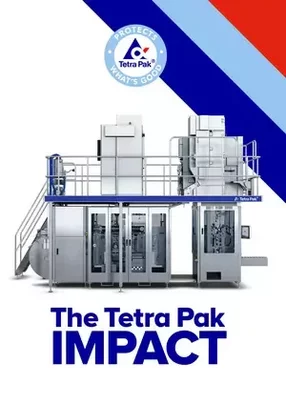How Tetra Pak Arabia is leading its industry in the region with innovation and green thinking
The name Tetra Pak is synonymous with innovative packaging solutions and processing technologies for food and beverages around the globe.
In the early 70s, Tetra Pak started its major installation in Jeddah, Saudi Arabia. Today, the converting factory delivers around 10bn packaging products to food and beverage companies a year.
Overseeing the business is Niels Hougaard, Managing Director of Tetra Pak Arabia Area and Cluster Leader, Sales Management Greater Middle East and Africa (GME&A), Having worked in the company 22 years, in roles from Product Manager to Sales Director and beyond, Hougaard is well-placed to take the helm at Jeddah, where key business drivers are end-to-end customer service and innovation.
“Tetra Pak has built its business model around three different services: providing packaging materials, providing packaging and processing equipment, and providing technical services to support those,” says Hougaard. “These are the three pillars of our business, and we are building the food industry in this region by providing this service.
“In Tetra Pak Arabia, we focus on driving innovation together with our customers; we are the first in the world at many things we do, bringing new ideas and solutions to our customers to support their growth as well as investments to our factories.
Tetra Pak’s large footprint in Saudi Arabia ensures that its impact on the industry is heavy-hitting, and that it is ahead even of many of the company’s other international facilities. In 2015, the Saudi factory was fortunate enough to become certified by the Japanese Institute of Plant Maintenance (JIPM), one of the top manufacturing standards in the world. It was also awarded the Factory of the Year achievement in 2013, and is certified to ISO 14001 standards for its sterling work in sustainability and energy management.
“We kept applying for certifications at higher and higher standards,” Hougaard explains. “We’ve reached a level of manufacturing excellence that sets us apart even in a global context, thanks to a high level of expertise and the passion of our team. It differentiates us in the region.”
This arm of Tetra Pak boasts the largest aseptic packaging factory in the region and Tetra Pak’s largest straw factory in terms of volume produced, and in the nearly 50 years of existence in Saudi Arabia, the packaging produced for the food industry also been used in Europe, parts of the Americas, and the Far East. Specialising in dairy, drinks, and liquid foods, Tetra Pak packaging is light and economical, offering high levels of protection and ease of use.
Tetra Pak looks to industry trends for working out new ideas, and a current project is looking at more convenient packaging solutions.
Hougaard says: “We are now providing young consumers with new developments of packaging that are environmentally friendly and easy to carry on-the-go. Not just dairy or juice, but light meals too, to open and consume immediately without the need to refrigerate. The market is moving towards convenience, and we are ready to provide the technology that meets the customer demand.
See also:
- Gulf Joint Procurement programme helps to standardise medicine supply in the GCC
- AUB leads Lebanese procurement transformation
- Education Corporation America: Student-centered procurement
“We’re always keen to bring in new ideas to push the value of continuous innovation,” Hougaard continues. “We bring new solutions to the market at global and local levels. Recently, we have adapted our factory in Jeddah to meet new and even more consumer-friendly packaging solutions, based on technology that we used to import from Turkey. With this technology update we can produce it here. With this we became more effective in serving our local customers in a faster and cost-effective manner. So, it’s always about bringing in new ideas and bringing new concepts to work – for our customers, the Arabian consumers and for ourselves – to be able to perform better.”
Tetra Pak’s innovation is as much about technical solutions as packaging solutions. One of the company’s latest innovation is HoloLens, which allow our technical experts to work remotely with customers on diagnostics and repairs. Service engineers use Microsoft’s HoloLens devices to guide customers along the process, ensuring positive relationships and a technological edge.
“We work with our customers as partners,” says Hougaard, “and we always seek to grow together with them. We provide them with leading edge technologies to help them maintain their competitiveness, and at the same time we develop ourselves and keep Tetra Pak Arabia an exciting place to work.
Of course, it is through our Tetra Pak’s people we make it happen. With around 15 nationalities working together at the Jeddah facility, the company’s motto is ‘diversity is our strength’, and it believes that the right people with the right qualifications are best suited to grow with the business as it does.
Working with partners also extends to Tetra Pak’s collaboration with the Forest Stewardship Council (FSC), the only internationally recognised standard-setting organisation for responsible forest management. The company just celebrated a decade of this certification to emphasise its commitment to maintaining best practices in handling trees throughout the entire supply chain of its operations.
Hougaard adds: “Apart from our technology investments, we work to help achieving the Saudi National Transformation Plan 2020 on two pillars; Developing the Tetra Pak Technical Training Academy to equip local talents with knowledge required for their job roles. Secondly, working on empowering women by hiring more females into important jobs into our facility.”
Manufacturing is, after all, an integral part of Saudi Arabia’s 2030 Strategy. It is Tetra Pak’s responsibility to help accelerate that and be an example for smaller industry players, supporting economic development and continuously improving from within.
“We remain excited about our long-term presence in Saudi Arabia, and for our contribution to innovation and making food safe and available in The Kingdom,” Hougaard concludes.

